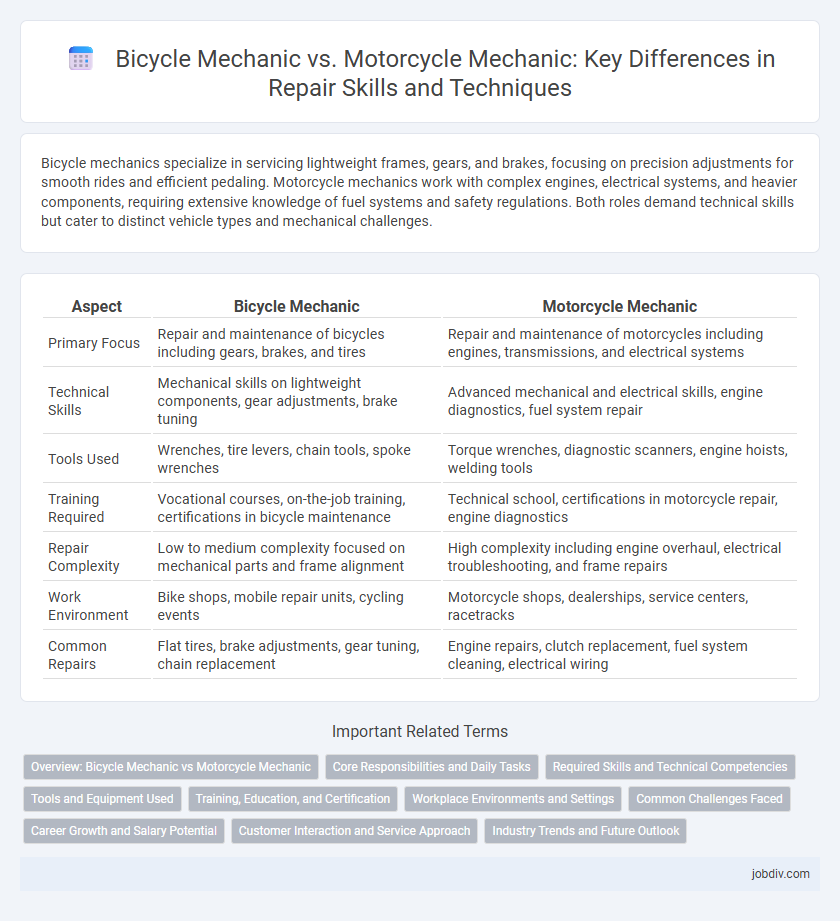Bicycle mechanics specialize in servicing lightweight frames, gears, and brakes, focusing on precision adjustments for smooth rides and efficient pedaling. Motorcycle mechanics work with complex engines, electrical systems, and heavier components, requiring extensive knowledge of fuel systems and safety regulations. Both roles demand technical skills but cater to distinct vehicle types and mechanical challenges.
Table of Comparison
| Aspect | Bicycle Mechanic | Motorcycle Mechanic |
|---|---|---|
| Primary Focus | Repair and maintenance of bicycles including gears, brakes, and tires | Repair and maintenance of motorcycles including engines, transmissions, and electrical systems |
| Technical Skills | Mechanical skills on lightweight components, gear adjustments, brake tuning | Advanced mechanical and electrical skills, engine diagnostics, fuel system repair |
| Tools Used | Wrenches, tire levers, chain tools, spoke wrenches | Torque wrenches, diagnostic scanners, engine hoists, welding tools |
| Training Required | Vocational courses, on-the-job training, certifications in bicycle maintenance | Technical school, certifications in motorcycle repair, engine diagnostics |
| Repair Complexity | Low to medium complexity focused on mechanical parts and frame alignment | High complexity including engine overhaul, electrical troubleshooting, and frame repairs |
| Work Environment | Bike shops, mobile repair units, cycling events | Motorcycle shops, dealerships, service centers, racetracks |
| Common Repairs | Flat tires, brake adjustments, gear tuning, chain replacement | Engine repairs, clutch replacement, fuel system cleaning, electrical wiring |
Overview: Bicycle Mechanic vs Motorcycle Mechanic
Bicycle mechanics specialize in maintaining and repairing pedal-powered vehicles, focusing on components like gears, brakes, and chains, often requiring precision and knowledge of lightweight materials. Motorcycle mechanics handle powered two-wheelers, addressing engine diagnostics, electrical systems, and performance tuning, with expertise in combustion engines and complex mechanical parts. Both roles demand mechanical aptitude, but motorcycle mechanics typically require deeper understanding of motorized systems and safety regulations.
Core Responsibilities and Daily Tasks
Bicycle mechanics focus on adjusting brakes, tuning gears, and repairing punctured tires to ensure smooth and safe rides, often working with lightweight frames and precision components. Motorcycle mechanics handle more complex tasks such as engine diagnostics, electrical system repairs, and fuel system maintenance, requiring specialized knowledge of combustion engines and heavy-duty materials. Both roles demand mechanical skills and problem-solving abilities but differ significantly in technical complexity and equipment.
Required Skills and Technical Competencies
Bicycle mechanics require proficiency in wheel truing, brake adjustments, and gear tuning, emphasizing precision and lightweight component handling. Motorcycle mechanics must master complex engine diagnostics, fuel system repair, and electrical troubleshooting, demanding in-depth knowledge of combustion engines and advanced mechanical systems. Technical competencies for motorcycle repair often include familiarity with computerized diagnostic tools, whereas bicycle mechanics prioritize manual skills and ergonomic adjustments.
Tools and Equipment Used
Bicycle mechanics primarily use specialized hand tools such as tire levers, spoke wrenches, and chain breakers designed for lightweight frames and delicate components. Motorcycle mechanics require heavy-duty diagnostic equipment, torque wrenches, and hydraulic lifts to handle complex engines and larger mechanical systems. Understanding the distinct tools and equipment is essential for efficient repair and maintenance in each field.
Training, Education, and Certification
Bicycle mechanics typically undergo vocational training or apprenticeships focused on hands-on skills and maintain certifications such as the Professional Bicycle Mechanic Certification (PBMC). Motorcycle mechanics require more extensive education, often completing formal technical programs in automotive repair with certifications like the Motorcycle Safety Foundation (MSF) or ASE Motorcycle Certification. The complexity of motorcycle engines and electrical systems demands higher technical knowledge and specialized training compared to bicycle repair.
Workplace Environments and Settings
Bicycle mechanics typically work in smaller, community-oriented bike shops or outdoor settings with ample natural light and ventilation, focusing on fine-tuning manual adjustments and lightweight components. Motorcycle mechanics operate in larger, industrial-grade workshops equipped with heavy-duty tools, hydraulic lifts, and diagnostic equipment to handle complex engine repairs and electrical systems. The contrasting workplace environments reflect the differing technical demands and scale of maintenance required for bicycles versus motorcycles.
Common Challenges Faced
Bicycle mechanics often encounter challenges such as dealing with delicate gear systems, aligning wheels precisely, and troubleshooting brake issues caused by cable tension or disc rotor alignment. Motorcycle mechanics face more complex problems including engine tuning, electrical system diagnostics, and handling hydraulic brake repairs under higher stress conditions. Both professions require strong problem-solving skills and familiarity with mechanical components, but motorcycle repair demands a deeper understanding of internal combustion engines and advanced electronics.
Career Growth and Salary Potential
Bicycle mechanics typically experience steady career growth within local shops and cycling communities, with salaries averaging $30,000 to $40,000 annually, reflecting modest earning potential in a niche market. Motorcycle mechanics often enjoy higher salary potential, ranging from $40,000 to $60,000 per year, driven by demand for specialized skills in larger repair shops and dealerships. Career advancement for motorcycle mechanics includes opportunities for specialization, management roles, and technical certifications, contributing to greater long-term earning potential compared to bicycle mechanics.
Customer Interaction and Service Approach
Bicycle mechanics often engage more personally with customers, offering tailored advice on maintenance and riding habits to enhance performance and safety. Motorcycle mechanics typically focus on technical diagnostics and repairs, emphasizing precision and adherence to manufacturer specifications for high-performance machines. Both prioritize clear communication but differ in their balance between hands-on guidance and complex mechanical expertise.
Industry Trends and Future Outlook
Bicycle mechanics specialize in maintaining and repairing lightweight, environmentally-friendly transportation with growing demand driven by urban cycling trends and e-bike technology advancements. Motorcycle mechanics focus on complex engine systems, where innovation in electric motorcycles and stricter emission regulations shape industry skills and job requirements. The future outlook for both trades emphasizes technical expertise in electric propulsion and digital diagnostics, reflecting broader shifts towards sustainable mobility solutions.
Bicycle Mechanic vs Motorcycle Mechanic Infographic

 jobdiv.com
jobdiv.com